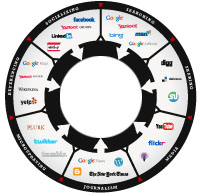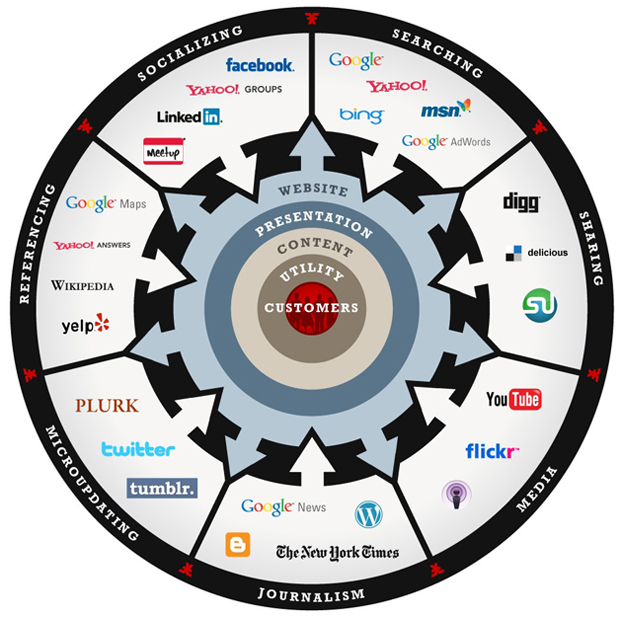The Web Marketing Universe
July 2009
By The Architect
Confusion about successful web marketing is rampant. Even for those in marketing, there's an ongoing war to maintain clarity about how the web universe works and how successful web marketing is executed today.
Building an outperforming web platform is very much like building and running a retail store whose primary objective is providing a product or service.
- The store must be attractive, have a good location and be unique to attract visitors.
- The store’s layout, personnel and operations must serve the customer and make the sales process as easy as possible.
- The experience must promote the visitor to return to the store.
- The experience must transform the visitor into a customer.
- The experience must provoke visitors to tell others.
- The experience must promote customers to become repeat customers.
And while the foundational recipe for a successful website is very similar, getting there is completely different.
Life happens faster online. While visitors peruse a physical store, website visitors “use” an online store. They can leave just as easily as they walked in. Their attention spans are much shorter, and their tolerance for a confusing layout or arduous pathways is low.
There are no roads leading to the Internet storefront. The idea of “getting there” is completely different. The straightforward “location, location, location” mantra is replaced with a myriad of new approaches and considerations to gain the foot traffic you need to be successful online.
So, from the never-ending minutia of terminology, buzzwords and techno-jargon, let’s clear the air for once and get some things straight about what makes a successful web marketing machine.
Metrics
Before anything is done, before the first photo is taken, before the first line of code is written, you must take account of what you know. In the web world, everything is in the numbers. From the unaware prospect to the loyal return customer, all possibilities and measurements must be mapped out within the sales continuum.
Where do your customers come from? How much does the average customer spend with you in a year? How much is spent to gain one customer? What has your past advertising and marketing efforts yielded? Who are your repeat customers? Why do customers come back? Why do customers leave? Are you doing everything you can to measure all elements that directly and indirectly affect sales?
There is much inventory and soul-searching in identifying your metrics. You must be honest about what you know and what you don’t know. You must be critical and able to grade yourself. Doing the homework here will not only guide the purpose of all your web marketing efforts, but also allows you to measure your return on investment, make adjustments and out-perform your competitors.
Utility

In the vastness of the Internet, there are two classes of websites: the digital brochure and the utility site.
Most websites are the first kind––the online equivalent of a printed flyer. Yup, all the computing processors, memory, software, hardware, power and communication lines for people to read the same information that they would get from a brochure. The brochure site states its case, makes its pitch and then its done. That’s what many companies do with their brands on the Internet, and their website’s performance is a reflection of it.
Your website needs to be useful, not just informative about your primary business objective. Many websites waste inordinate amounts of time and money promoting a site with no utility. Its visitors see no reason to return, and it dies right there. The precious opportunity to turn a casual visitor into a return visitor—the web version of true branding—is sadly wasted.
Your website needs to find its place on the Internet. It needs to be known for something. Awareness and traffic on the web is cumulative, and all the time used to gain a visitor is wasted if the site is not worth bookmarking, sharing, remembering or revisiting.
To achieve this, you must be prepared to invest in your site’s utility. You must have an offering to the public at large, without the visitor needing to be a customer.
Your website needs to find its place on the Internet. It needs to be known for something.If you sell lawn fertilizer, offer a lawn care calendar for the visitor’s geographical area, e-mail alerts on care stages, free weekly lawn care tips and write a regular article. Create a place the visitor can count on, all the while promoting your brand and selling your product or service.
Comparative shopping listings, mortgage amortization calculators, games, a “rare word of the day” and “your lawn care tip of the week” are all beginnings of utility for a website. If your competitors are already introducing utility in their online store fronts and developing a reputation for having a website that’s worth returning to, then you have something to worry about. Don’t wait until then. Up the ante and don’t waste another visit to your site.
Content

Many times the utility of a good website resides in the content it offers. Now this is where many websites have an identity problem. Most view their website’s static “brochure” text regarding their product or service as the website’s content. It isn’t.
Content has purpose and application to the visitor beyond your primary offering. It may not apply to everyone, but it needs to be content that your audience wants to read, see, play, view, hear and interact with.
Content has been and always will be king. As a result, the content maker is king. Believe it or not, writers are usually the single most important factor to the successful website core. If your website features piano playing tips in video form, then the video producer owns the role of king.
Don’t regard your website as a one-time sales pitch. Invest in content and the long-term rewards will be exponential.
The idea

The challenge of utility and content represents the stage where the good idea is born.
If your website doesn’t present any reason for a visitor to return, then it’s useless. Your website’s success is based on its core concept. What is it going to offer people? What is its reputation going to be? What about your content is going to make people talk about it, forward its web address, bookmark it, share it and most important, what is going to make people come back to it?
This is where a good web development firm shines. The responsibility of your web development firm is to make sure the idea around your utility and content is sound and executable. Web professionals work hard to stay abreast of what the Internet landscape—and all competitors—provide. They know what people want, what’s lacking, where the opportunities are and where to drill for maximum gain.
Presentation

You’ve got your idea, you’ve found your niche, you’re creating great content––now we can talk about building a beautiful and functional website.
Crafting a superstar website is its own discipline. Professionals that build memberable websites master a craft that is like no other.
Once again, the Internet’s vast array of possibilities and potential are the reason so much more must be considered. Take, for example, reading a magazine. The magazine contains a catalog of content. It employs the simple interface of a table of contents, page numbers and the action of turning the pages—that’s it.
In contrast, a website has multiple dimensions and depth. It does more than display your content—it’s functional. It stores content, catalogs it and queries it. It reacts. It allows for conversation and builds community. Your 24-hour Internet house is, in short, a working engine that must reflect your brand proudly, be functional and easy-to-use and run itself without you in the room.
Your website is a working engine that must reflect your brand proudly, be functional and easy-to-use and run itself without you in the room.
But with great power comes great responsibility—in design and function. It’s very much like building a unique, first-of-a-kind car from the ground up, combining art and precise engineering into a beautiful, functioning machine. There is a metric ton of considerations in any given website, right down to the psychology of choice. As a result, there are many amateur web
designers, but very few great web
builders.
Still, many companies rely on traditional marketing agencies who see web development akin to the linear development of print material, television commercials or radio spots [
see our article on the fall of traditional marketing companies]. In other cases, some companies employ a single individual––usually a programmer or a designer––to build a competitive website that in reality requires experts from many disciplines. Both of these extreme approaches to web building leave a trail of failed websites littered around the Internet landscape.
The memorable and over-performing website requires a unique and specific combination of expertise from an array of web professionals, all working in concert on the details and all joined together on the big picture. That doesn’t mean you need teams of people working around the clock, but you will need portions of their knowledge and interactive specialties to craft it the right way the first time. In fact, the right way costs less upfront and makes your investment that much more powerful.
Traffic Building

You’ve established a good foundation with your web marketing strategy and metrics; you’ve got an online building that’s both beautiful and very useful; now the focus turns to building foot traffic.
While the traffic building plan is part of the web marketing strategy, its execution is on an ongoing basis. The exact strategies and tactics for traffic building are different for each business, brand, product or service, and covering all the possibilities would be beyond the scope of this article. Effective traffic building, however, depends on one key element: the relation of a website’s utility and content to the community at large.
Food for thought: In the beginning, you will start with any traffic. However, the public does reside with other websites. Those other websites have provided a platform for community. There are an endless number of online communities on everything from aardvarks to zucchini that people bookmark, remember and participate in––weekly, daily, hourly. You need to be there too. Identify those spots and begin participating in them. Be real and helpful. Promote your brand when appropriate, and promote your personality in the process. Link to some of your good content. Extend an offer outside your primary objective. Create and build a reputation.
Again, there’s more to this than a simple example can convey. Simply put, there must be regular engagement with the public outside of your website. People engage with companies through the best form of advertising: word-of-mouth. The Internet just sets that on fire.
Visitor-to-Customer Conversion

The science and art of converting a visitor into a customer is unique to each web marketing plan. It begins with identifying, marking and sometimes even coding-in conversion points within the site. Conversion points can be the creation of an account, the point at which a product is sold, the submission of a contact form or the making of an appointment. The array of possible conversions are unique to the business; however, they tie directly to the bottom line.
This is where the experienced web development agency brings metrics back into play. All efforts in traffic building and advertising are mapped; traffic from websites, search engines and other sources are cataloged; traffic is tracked to conversion points within the site; analysis is taken and actions to improve traffic and the rates of conversion are continuously implemented.
Such complexity is beyond the expertise of traditional marketing firms or the one-man-band.
Getting Started - The Big Picture
Yes, at first glance this is a lot to take in. That’s why it’s important to interview your marketing firm to make sure they not only recognize the web marketing universe, but that can also execute on it and show results.

We’re here to help.
Call or write us. We promise to answer all of your questions in a straightforward manner and help you understand it all.
If you’re already engaged or under contract with another firm, at least ask your firm—and yourself—the tough questions:
- What is the plan?
- Why will people come to your website?
- What will keep visitors coming back?
- What will make visitors tell others?
- What will convert visitors to customers?
- How is it performing?
And most of all: What will make people fans of your website? This is ultimately the goal of any web marketing campaign, and it's indicative of any superstar website. From local dentists to international corporate brands, anyone can reach the apex of online marketing, win more customers and gain market share for less money.
Remember: fans do the marketing for you.
Behind every superstar website there is an architect, scrutinizing every single detail, cutting through the nonsense, and challenging every aspect to craft a masterpiece that gets noticed and gets results.